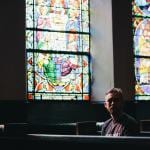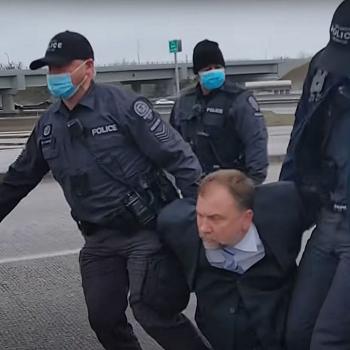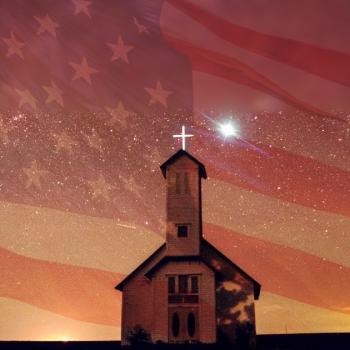There is nothing inherently wrong with desiring safety and enjoying comfort—but the rather obvious statement to make is that the world is not safe and comfortable. It is, after all, dangerous business going out your door. The world is full of nasty pitfalls, trials, sufferings, and things like diseases, pestilences, plagues, and even pandemics. The world is teeming with those who wish to do you harm and things to be harmed by. Yet the world has always been this way to our memory. Only two people ever experienced true safety and comfort, yet they invariably traded this away in their quest to be like God. Since then, the world has always been one step away from total political upheaval or natural cataclysm. Nine countries have the power at their fingertips to start an inevitable chain reaction of a worldwide, nuclear war—and yet the statistical likelihood of people dying in this manner as opposed to another matters very little when the death rate is unanimous.
Since sin entered the equation, there has been an unceasing enemy pursuing every man, woman, and child: death. That same great enemy has wreaked havoc in the world in tandem with its fellow adversaries to the people of God, sin and Satan. These three great enemies have lured person after person under the pretense of that which their soul longs for: eternal life. Yet seldom does this desire manifest itself in the conversion of sinners for a multitude of reasons, not the least of which being shown to us in the Parable of the Sower. Whether they fall away on account of affliction, suffering, persecution, or a love of money and this world, they nonetheless pursue only that which comes most purely in and through Christ. It is under this great desire for eternal life, that we find their conquest to be in pursuing eternal life’s benefits, safety and comfort, apart from their source.
In other words: they have traded physical violence for spiritual violence. They have gained an earthly safety at the expense of heavenly safety, and just like any other temptation mankind is brought under, they make crafty little idols out of the lusts of their hearts. They sin to receive these idols and even sin when they don’t receive them. They commit cosmic treason because they love and crave that which only God can give them in Himself, as they demand it to be found in creature comforts. The reason they do this is simply because they love the life they currently have and simultaneously have no genuine hope in the life to come, and the reason they do this is that they have fallen under the spell of the illusion of safety. For a moment’s peace on earth they drink down the dregs of God’s wrath.
This is nothing new, of course. Even many within the church have been doing this for years, as they’ve fallen for the same alluring promises that the broader culture has. In many instances we find the church, much like the nation of Israel, has exchanged the security and comfort found in their God for the earthly creature comforts this world pursues. While many may no longer boast in chariots and horses, surely, many a modern American will call to remembrance whatever it is they believe gives them security in a tumultuous world. Be it a stable job, financial stability, a well-stocked pantry, a regulated workout and diet plan, the doctor’s ability to patch up your heart, the scientific community’s ability to whip up an antiviral, a mask—most live in a state of sheer contradiction.
One man’s heart is about to give out tomorrow for a lack of self-control in his diet, yet his finances are set to take care of him for decades. Another lives with the strictest regime of diet, exercise, and what is tantamount to body worship of the most extreme sort, yet he lives in a state of wanton sexual license. Neither man accounts for the price he must pay when his life is demanded of him—thus both are fools to the uttermost. Yet how much greater a fool is the Christian who says he takes God at His word, only to live as if everything is still within the grasp of his own control—that he can add even one nanosecond to his life by his choosing? Surely, the point is not that one ought to live an unbridled life, but rather asserts that if such an individual believes they, or anyone else for that matter, will ultimately live longer by doing whatever it is that they are doing, they are bound by the same folly as the unbeliever, yet it is worse as a believer! If I know the truth and yet do not live by that truth, am I not the greater of two fools, if the second is a fool by ignorance? How much greater display of folly is the Christian man’s whose hypocrisy is on full display—is he not doubly guilty, both of his sin, and his witness to God’s faithfulness?
The overarching point I am driving towards here is simply that God is no less our genuine Refuge in the midst of this day as He is in any point in history. He is the author of every single moment in time and space. Every single instance, every minute detail, is under His sovereign control. The common graces given to modern man do not lower our expectations on God’s ability to keep us safe from harm. Likewise, these common graces given no more lower God’s expectations on us to live in a state of complete trust and confidence in Him, and Him alone. We are to place no trust in princes or mortal men to save—and yet the plight of many Western Evangelicals is to do just that. We are terribly clever at rationalizing all of the ways we can and should place our trust in things other than God Himself, and nothing has revealed this quite like the current climate we find ourselves in. From arguments over masks to keeping churches open, people are in a veritable frenzy over what I can only see as a desire to keep things as “safe” as possible. If we genuinely believe that God is the means of our safety, this has some incredibly practical implications, that while not leading to blind determinism, demand much more than modern Christians seem to be able to muster up.
Pastors are forsaking their duties to shepherd in the midst of a pandemic, yet quite easily and happily jump into the lap of secular, ideological movements blatantly opposed to the gospel. To put it as clearly as possible: they shut down their churches for months at a time, for fear the Coronavirus will spread amongst their members, yet have no qualms showing up at protests in their cities to support a false narrative of systemic racism. Many are giving ample pushback against a man like John MacArthur for defying California’s government restrictions on churches, seemingly as if he and the elders at Grace Community Church are acting out of confusion, lack a love of their neighbor, or don’t recognize Christian freedom in the midst of responses to the pandemic. Perhaps, and this is just a wild suggestion, mind you, but perhaps MacArthur and his fellow elders have arrived at their conclusions quite intentionally, as this is a time for Christians to have some backbone and give a firm, yet polite, “No.” Even more clearly, they ought to perhaps give a resolute, “No,” when a certain governor’s orders are indefinite, and clearly encroaching upon the structure and nature of the service itself. None of this makes them guilty of violating Romans 13, nor does it make their statements universally binding, unless of course the assumption is granted that this is so.
MacArthur’s church went along with Newsom’s orders for about five months, which shows not only an initial willingness to comply with their governing authorities, but a proper reason for it. When Coronavirus first hit—no one knew just how deadly this disease would be. Initial models predicted we were potentially in for another round of the Spanish Flu, which while making church closures unfortunate, nonetheless made them understandable for a period of time. Where we are at today shows a rather different trajectory of a virus, that while dangerous, is not nearly as deadly as it was initially made out to be, and this is the context wherein the elders at Grace speak. The effects of the shutdowns have been more devastating than the virus itself—something I made comments about the potential of early on here. Even the CDC director has openly stated that there are greater public health risks in keeping schools closed—yet the consensus across the nation is that most schools will remain closed this month. As this pandemic continues, the nation continues to divide more sharply on these points.
The lines on all fronts, churches included, are not drawn on whether or not there is a time to defy these orders, but whether or not this is the time to defy these orders. There is a case for civil disobedience, which we (the church) all recognize, yet we diverge on where the proper line is to be drawn. I believe this is the time for defiance, albeit a peaceful resistance, and one such reason for this is simply that it is perfectly reasonable to assume our government won’t stop at violating a clear directive given to the church to assemble. Surely, this initial wave of action is not going to shift from threatening to shut off the power to marching Christians off to the “Gulag,” but you don’t arrive at the “Gulag” without some initial and intermediary steps being taken. Concessions of freedoms are accomplished over time until it is perfectly ripe to seize the reigns utterly and completely, so that the church is no longer free in any meaningful capacity. However, simply because we are not yet at a point of total dominance does not stop these current restrictions from governor Newsom from being unconstitutional, nor does it mean that civil disobedience is unwarranted simply because you may feel a line has not been reached. In essence, my question to those of you who would say this is not the time for defiance is where you draw that line. My second question is if you draw the line somewhere down the road, will it have been too late? What I specifically mean by this question is if you draw the line at physical persecution, or particular persecution against only Christians, is if there will be anything left for you to do at that point to oppose measures found to be too restrictive. My third question is what your motivation is for drawing this line where you do?
I ask you these questions because I tend to find that what you currently believe about the deadliness of the Coronavirus determines what you believe churches should be willing to comply with in terms of government orders. That has been the determining factor in many instances for people, I suspect even for some of those whom I linked to above. I further suspect that people don’t see the severe double-standard against churches as opposed to essential services (like abortion centers) as something that is inherently problematic for the trajectory of the government’s imposition upon the church. It may be a surface level issue for many, but they do not see it as an overt attempt to marginalize a group of people that in many ways is a thorn in the side of politicians, and has been for years. In addition to this, I find many operate under the assumption that persecution does not come in degrees, nor is it always relegated to one particular people group. All of this is problematic, but perhaps what is most problematic is the notion that again, people’s concerns are largely safety-driven, on the basis of the government’s ability to keep them safe, no less.
Now, I will grant that I am far less optimistic about our governing authorities than many of my Christian peers (save my Libertarian brothers and sisters). I have a complete disdain for conspiracy theories as well—but if you were to look at me with a straight face and tell me that the response to the Coronavirus pandemic has been purely motivated by the interest of people’s lives, I would believe you have little to no discernment whatsoever. If you were to agree that our governing authorities have imposed an undue burden that goes beyond their powers (and even is a severe double-standard against religious institutions), yet were suggest that this isn’t problematic, nor that it won’t become so, I would wonder how adept you are at seeing the writing on the wall with the church in the States. The walls are continually being pressed further in on all fronts of the church’s broader public life. Christianity is not popular on multiple fronts—a thing many critics of MacArthur, et. al, are quick to point out—yet a thing they don’t seem to apply consistently to this particular front. Instead, many critics appeal to the church’s collective “public witness.”
Frankly, I believe one of the best things that Christians could do is to stop caring what the world thinks of them. So much sanctioning of pure theological and practical garbage has happened under the guise of “not giving them the occasion to blaspheme,” that I don’t believe most Christians actually understand what that phrase means. Instead of focusing on issues of hypocrisy on substantiated sins, what is invoked by this falls under the auspices of “things I don’t agree with.” Anything and everything tends to fall under this umbrella of the church’s “public witness,” which in the end is no more than an appeal to the emotions rather than substantive biblical arguments. It is a tired argument that rings hollow and needs to die. I no more care of the public’s opinion on matters of the church being open, singing, partaking of the Lord’s Supper and Baptism, and abiding by social distancing and mask practices during the pandemic, than I do the public’s opinion on the church’s stance on historic doctrines of the faith. Why? Because they really don’t have a seat at that table, which is precisely the whole point of the elders at Grace.
Obviously in all of this, there is a breaking point we must acknowledge; no reasonable person believes there should be absolutely no laws legislating people’s actions. Yet just as there is a breaking point to safeguard against unbridled autonomy, there is a breaking point to safeguard against unbridled legislation. The trade-off between autonomy and sovereignty, at least as it is perceived, is safety, and its sister idol, comfort. If you desire to maximize freedom, it comes at the expense of safety and comfort. If you desire to maximize safety, all one must do is part with some freedoms—but only the freedoms, of course, that the state itself deems are necessary to forsake. The problem with this line of thinking is not that this happens; again, everyone is fine with the fact when certain freedoms are excluded, especially Christians when they are aligned with biblical precedent. The problem is that when the state draws an arbitrary line that impedes upon the church’s services and the church draws an arbitrary line on when they should defer to the state’s judgment, we end up finding our freedoms forfeited far sooner than if we actually put a foot down ahead of time, rather than years after the fact, like the broader church has done on every single social and political issue of the past. Again, I believe part of this is owing to the fact that many Christians are completely fine with the government stepping up to offer safety and comfort and direction. Many today will simultaneously laud a man like Martyn Lloyd-Jones for continuing church service during an World War II air raid, yet I wonder how many would be in favor of his church being shuttered for the sake of their safety if they lived to see it firsthand.
The reality is that everyone loves the government’s enforcement of ideals they agree with, especially when one considers such ramifications on personal and corporate well-being—yet we all lose when the same standard gets applied unanimously across party lines and fundamental freedoms are forfeited. The point being made here is not that consideration of well-being ought to be neglected, but rather, that things are far more convoluted on this spectrum than the one-dimensional propositions being given against those critical of the government response to Coronavirus. Couple this with the fact that things like masks have even been politicized in the first place and a rather large part of the problem is revealed: our nation is largely unable to tolerate those who disagree with one another. That is a rather telling point of many arguments I see—that those who disagree are fundamentally in denial of science and lack basic reasoning skills, they don’t love their neighbors, they are historically ignorant, etc., rather than the fact that some are intelligible adults who make conscious decisions based on reasonable conclusions that are still different than your own. Yet instead of that, they must abide by coercion of the state because they, to put it colloquially, “deny reality” as it is seen by their critics.
When the church at large sees that the state’s intrusion is not only ok, but good, I genuinely wonder if, at least in part, they are trusting in princes, chariots, and weapons of war rather than God, and God alone. That clausal modifier at the end is important. God alone. Time and time again, especially in the Old Testament, we are treated to overtly clear examples of how trusting in things other than God Himself pans out for the people of God. We may just come to experience this firsthand for ourselves, if things continue to follow the trajectory they have.













